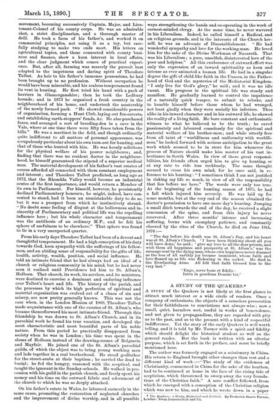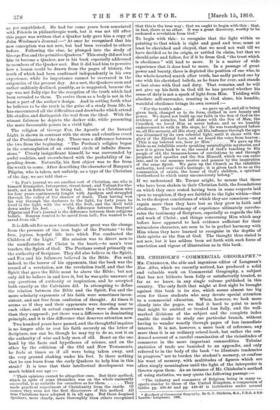A STUDY OF THE QUAKERS.*
A STUDY of the Quakers is not likely at the first glance to
much interest or a wide circle of readers. Once a company of enthusiasts, the objects of a senseless persecution for their faithfulness to convictions not always wise ; now a small, quiet, harmless sect, useful in works of benevolence, and not given to propagandism, they are regarded with pity as to the past, and as to the present with a kind of respectful indifference. Yet the story of the early Quakers is well worth telling, and it is told by Mr. Turner with a spirit and fidelity which should delight the historical student as well as the general reader. But the book is written with an ulterior purpose, which is set forth in the preface, and must be briefly mentioned here.
The author was formerly engaged as a missionary in China. His return to England brought other changes than rest and a different kind of work :—" The study of the evidences of Christianity, commenced in China for the sake of the heathen, had to be continued at home in the face of the rising tide of scepticism, which threatened to sweep away the very founda- tions of the Christian faith." A sore conflict followed, from which he emerged with a conception of the Christian religion which was new to him, and which he wrote down in a paper • The Quakers: a Study, Historical and Critical. By Frederick Storrs Turner. London : Swan Sonnenschein and Co.
as yet unpublished. He had for some years been associated with Friends in philanthropic work, but it was not till after this paper was written that a Quaker lady gave him a copy of John Woolman's Journal :—" At once he recognised that his new conception was not new, but had been revealed to others before. Following the clue, he plunged into the study of George Fox and the primitive Quakers." This study did not lead him to become a Quaker, nor is his book especially addressed to members of the Quaker sect. But it did lead him to perceive how a lesson could be drawn from the pages of history, the truth of which had been confirmed independently in his own experience, while its importance cannot be overrated in the exigencies of the present day. As a sect, the Quakers soon and rather suddenly declined, possibly, as is suggested, because the age was not fully ripe for the reception of the truth which had been revealed to them. To revive them as a body is not in the least a part of the author's design. And in setting forth what he believes to be the truth in the guise of a study from life, he has encountered all the difficulties and drawbacks which attend life-studies, and distinguish the real from the ideaL With the utmost fairness he depicts the darker side, while presenting the more favourable points in a vivid light.
The religion of George Fox, the Apostle of the Inward Light, is shown in contrast with the stern and relentless creed of the Puritanism of the day. There was a difference between the two from the beginning. " The Puritan's religion began in the contemplation of an external circle of infinite dimen- sions." Utterly insignificant himself, he was surrounded by awful realities, and overwhelmed with the probability of im- pending doom. Naturally, his first object was to flee from • the wrath to come. After describing the character of Bunyan's Pilgrim, who is taken, not unfairly, as a type of the Christian of the day, we are told that-
" In Fox's journal we see another sort of Christian, one who is himself Evangelist, Interpreter, Great-heart, and Valiant-for-the- truth, not in fiction but in living fact. Here is a Christian who for four years continuously fought with Apollyon and struggled through the valley of the shadow of death. Then having won his way through the darkness to the light, for forty years he lived in the light, with the world, the flesh, and the devil held
down under his feet The difference between Bunyan's Pilgrim and Fox's journal is the difference between their religious beliefs. Bunyan wanted to be saved from hell ; Fox wanted to be saved from sin."
It is difficult for us now to estimate how great was the change from the pressure of the iron logic of the Puritans "to the free, joyous, hopeful life into which Fox conducted the
Children of the Light." His mission was to direct men to the manifestation of Christ in the heart,—to man's true teacher, the Spirit of God. The Puritans rested primarily on the authority of Scripture. They did also believe in the Spirit, and Fox and his followers believed in the Bible. Fox said, indeed, to the horror of his opponents, that the book was the record of a revelation, not the revelation itself, and that the Spirit that gave the Bible must be above the Bible; but not only did he believe in and love it, but he was quite unaware of any questions of authority or inspiration, and he accepted both exactly as the Calvinists did. In attempting to define the relation between the Bible and the Spirit, Fox and the more scholarly exponents of his faith were sometimes incon- sistent, and not free from confusion of thought. At times it seems as if they and their opponents were drawing near to each other, and in actual experience they were often nearer than they supposed ; yet there was a difference in dominating principle, and it is this difference that deserves attention now.
Two hundred years have passed, and the thoughtful inquirer is no longer able to rest his faith securely on the letter of Scripture, nor can he, though he may try to do so, rest it on the authority of wise and holy men of old. Beset on the one hand by the facts and hypotheses of science, and on the other by the criticism of the Old and New Testaments, he feels at times as if all were being taken away, and the very ground shaking under his feet. Is there nothing that be can learn from the early Quakers to help him in this strait ? It is true that their intellectual development was much behind our age :-
"Their opinions cannot be altogether ours. But their method, which in spite of some blemishes was on the whole eminently
successful, is as suitable for ourselves as for them They made practical experiment of Christianity from the inside. Of course they were not the first discoverers of this method. All true Christians have adopted it in all ages. But these despised Quakers, more clearly, more thoroughly than others recognised
that this is the true way ; that we ought to begin with this : that, in fact, there is no other. It was a great discovery, worthy to be reckoned a revelation from God."
To begin with this : to recognise that the light within us pointing to that which is right and good and true, must at least be cherished and obeyed, that we need not wait till we have decided as to its origin, or settled its claim, but that we should arise and follow, for if it be from God, "the trust which is obedience" will lead to more. It is a matter of wide experience that it does lead to more. In a passage of great power and beauty, there is depicted the position of one who, in the whole-hearted search after truth, has sadly parted one by one with his cherished beliefs, as he fears for ever, and stands at last alone with God and duty. That remains, and he will not give up his faith in God till he has proved whether his sense of duty is not a spark of light from Him. Yielding with absolute self-surrender, trusting in God alone, his humble, watchful obedience brings its own reward :—
" For the truth's sake we gave up all, and all is being given back, changed as to its form, clothed in new beauty and power. We dared not build up our faith in the Son of God on the evidence of miracles, but left alone with the Son of Man, the Crucified, we loved Him as never before, and as we humbly endeavoured to walk in His steps, lo ! He was transfigured before us, all His memory, all His story, all His influence through the ages was illumined by its own celestial light, until it shone with the glory of the Eternal Love, and we heard the voice from heaven : ' This is my beloved son, hear ye Him.' . . . . . We gave up the Bible as an infallible oracle speaking unintelligible mysteries, and now it is given back to us, the record of God's teaching to His people of old, the treasure-house of revelations to and through prophets and apostles and the Son Himself, which we can enter into, and in our measure receive and possess by the inspiration of the same Spirit. We gave up the Church as the infallible authority, lord over God's heritage; it is given back to us as the communion of saints, the home of God's children, a spiritual brotherhood to which many unconsciously belong."
If we understand Mr. Turner aright, he means that those who have been shaken in their Christian faith, the foundations on which they once rested having been in some respects laid open to suspicion, if they are faithful to the light within—that is, to the deepest convictions of which they are conscious—may regain more than they have lost as they grow in faith and obedience. The testimony of experience ultimately corrobo- rates the testimony of Scripture, especially as regards the life and work of Christ ; and things concerning Him which may before have appeared to lack evidence sufficient for their miraculous character, are seen to be in perfect harmony with Him whom they have learned to recognise in the depths of their spirits as the Son of God. The thought thus stated is not new, but it has seldom been set forth with such force of conviction and vigour of illustration as in this book.







































 Previous page
Previous page